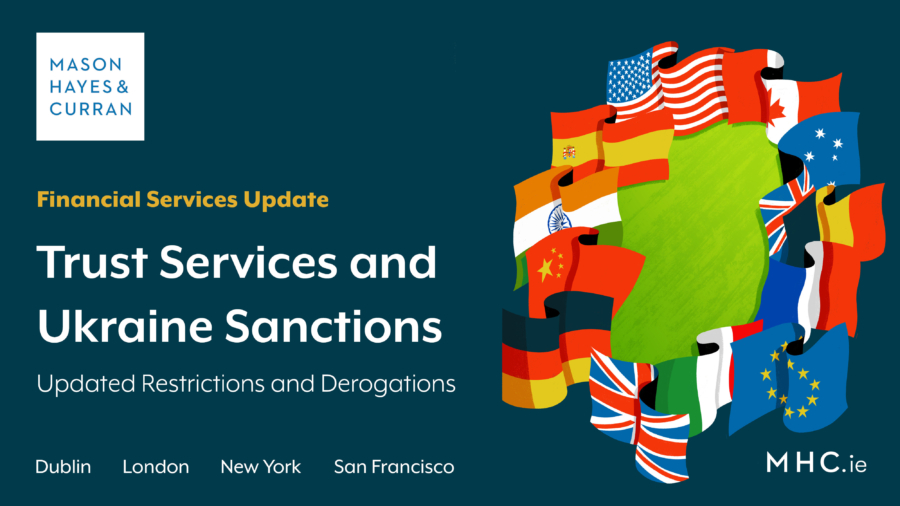Trust Services and Ukraine Sanctions
Updated Restrictions and Derogations

Council Regulation (EU) 833/2014 concerning restrictive measures in view of Russia's actions destabilising the situation in Ukraine (Regulation 833), sets out an extensive set of prohibitions and restrictions on trade in goods with, or the provision of certain services to (including financial services), certain classes of Russian legal or natural persons, certain named Russian individuals or entities and specified elements of the Russian state/government.
Regulation 833 has been amended several times since the Russian invasion of Ukraine.
Of particular relevance to trust services was the introduction of a new Article 5m, which we wrote about here. Since that note, Article 5m was amended by Council Regulation (EU) 2022/879 of 3 June 2022 and Council Regulation (EU) 2022/1904 of 6 October 2022. Also, some clarity as to its scope and proper application is provided by FAQs issued by the European Commission. We set out an overview of the updated position.
For convenience, we have set out Article 5m, as amended, in full at the end of this briefing note.
With limited derogations, Article 5m restricts on the provision of (what are generally called) fiduciary and corporate services, to trusts or similar arrangements, where the settlor or beneficiary of the trust is (broadly speaking) (a) a Russian national or natural person living in Russia, (b) a legal person, entity or body established in Russia, or (c) a legal person, entity or body which is owned, controlled by or acting on behalf of, or at the direction of, such Russian persons, entities or bodies.
The drafting of Article 5m is wide and potentially has a significant impact on the business and operations of corporate services providers (CSPs).
We would caution against reading Article 5m in isolation as it should be considered within the broader context of all other EU Ukraine-related sanctions legislation. These include the prohibitions on entering intro transactions with designated persons under Article 5aa of Regulation 833 and also the asset freezes set out in Regulation 269/2014 (Regulation 269).[1]
What is restricted?
Article 5m is aimed at the creation of, and the provision of services to, “trusts or similar arrangements” established by, or for the benefit, of Russians. Regulation 833 does not define “trusts or similar arrangements”. The commission issued an FAQ that broadly indicates that any arrangement in which the legal and beneficial ownership of assets are separated and in which the legal owner owes fiduciary duties to the beneficial owner would fall within this definition.
Before the amendments, Article 5m raised questions around how the restrictions would apply where the trust included a mix of Russian and non-Russian persons among its beneficiaries. The amendments have now expanded the derogations so that national competent authorities may authorise the provision of trust services with a mix of Russian and non-Russian beneficiaries as long as the trustee does not accept from, or distribute assets to, a Russian person.[2]
Competent authorities can also authorise the operation of trusts whose purpose is the administration of occupational pension schemes, insurance policies or employee share schemes, charities, amateur sports clubs, and funds for minor and vulnerable adults.[3]
However, it should be noted that these are not general exemptions, and each case needs to be authorised individually by a competent authority.
Orphan structures
We are generally of the view that servicing existing orphan trust structures is not prohibited under Article 5m. The orphan structure is commonly used by debt issuance SPVs that issue bonds or loans notes in debt capital markets and securitisation transactions. This structure is important as it allows the SPV to establish its independence, separation and insolvency remoteness from other transaction parties and entities, in particular its sponsor group. Under this structure, a professional trustee is appointed to hold the shares in the SPV as a nominee, on trust for a charitable purpose. The SPV then issues the bonds/notes and is able to use the funds to, for example (i) on-lend them to an associated company in its sponsor group to fund business activities (in a corporate debt transactions) or (ii) fund the purchase of a securitised portfolio of assets (in a securitisation).
The continued provision of services to an already existing structure of this nature, would not, in our view, be prohibited under Article 5m if the following conditions (which are typical of these kinds of structures) are met: (i) the settlor is a professional trustee which owns the shares (and is not, where we are dealing with these arrangements, a Russian entity) and (ii) the beneficiary of the orphan trust is a non-Russian charitable purpose.
Therefore, if correctly implemented, providing trustee services in an orphan trust structure should not be prohibited under Article 5m. This is sensible as the sanctions are not designed to prevent the outflow of money from Russia/Russian entities to repay their debts to bond/noteholders on existing transactions.
Problematic Issues with Orphan Structures
While a CSP may not be prohibited by Article 5m from acting as a share trustee in an existing orphan trust structure, it needs to consider other sanctions measures that could apply, especially under Regulation 833 and 269. Specifically, the CSP should review the proposed transactions which will make use of the structure, especially if there could be a Russian nexus. This includes carrying out due diligence on the profile, nationality and location of the persons involved.
In terms of due diligence it is important that the CSP verified that an orphan SPV to which is provides services is not directly or indirectly controlled by a sanctioned person and that it does not act at the direction of a sanctioned person. This diligence can be quite technical and complex and is beyond the scope of this note.
Conclusion
The additional derogations are helpful to trustees and corporate service providers, who hold assets in trust for beneficiaries, some, but not all, of whom are Russian, who would otherwise have had to ceased to act in breach of their fiduciary duties. But these are derogations and not general exemptions, and an application will need to be made to a competent authority and each situation assessed individually.
While trustees holding shares of orphan SPVs on trust for charitable purposes should be exempt from the prohibition in Article 5m, the degree of influence exercised by a sponsor group with a Russian nexus should be carefully assessed in the light of the broader sanctions measures currently in place. Trustees would be well advised to carry out due diligence on the associated companies of the sponsor group of the SPV in the light of the broader sanctions in place.
Our team of Debt Capital Markets and sanctions experts are ready to advise corporate services providers considering existing or new trustee appointments that might be impacted.
The content of this article is provided for information purposes only and does not constitute legal or other advice.
[1] Council Regulation (EU) No 269/2014 of 17 March 2014 concerning restrictive measures in respect of actions undermining or threatening the territorial integrity, sovereignty and independence of Ukraine
[2] Article 5m paragraph 5b
[3] Article 5m paragraph 6c
Article 5m
- It shall be prohibited to register, provide a registered office, business or administrative address as well as management services to, a trust or any similar legal arrangement having as a trustor or a beneficiary:
- Russian nationals or natural persons residing in Russia
- legal persons, entities or bodies established in Russia
- legal persons, entities or bodies whose proprietary rights are directly or indirectly owned for more than 50 % by a natural or legal person, entity or body referred to in points (a) or (b)
- legal persons, entities or bodies controlled by a natural or legal person, entity or body referred to in points (a), (b) or (c); (e) a natural or legal person, entity or body acting on behalf or at the direction of a natural or legal person, entity or body referred to in points (a), (b), (c) or (d)
- It shall be prohibited as of 5 July 2022 to act as, or arrange for another person to act as, a trustee, nominee shareholder, director, secretary or a similar position, for a trust or similar legal arrangement as referred to in paragraph 1
- Paragraphs 1 and 2 shall not apply to the operations that are strictly necessary for the termination by 5 July 2022 of contracts which are not compliant with this Article concluded before 9 April 2022 or of ancillary contracts necessary for the execution of such contracts
- Paragraphs 1 and 2 shall not apply when the trustor or beneficiary is a national of a Member State, of a country member of the European Economic Area or of Switzerland, or a natural person having a temporary or permanent residence permit in a Member State, in a country member of the European Economic Area, or in Switzerland.
- By way of derogation from paragraph 2, the competent authorities may authorise, under such conditions as they deem appropriate, the services referred to in paragraph 2 to continue beyond 5 July 2022, for:
- the completion by 5 September 2022 of operations strictly necessary for the termination of contracts referred to in paragraph 3, provided that such operations were initiated before 11 May 2022, or
- other reasons, provided that the service providers do not accept from, or make available to, the persons referred to in paragraph 1 any funds or economic resources, directly or indirectly, or otherwise provide such persons with any benefit from assets placed in a trust.
- By way of derogation from paragraphs 1 and 2, the competent authorities may authorise the services referred to in those paragraphs, under such conditions as they deem appropriate, after having determined that this is necessary for:
- humanitarian purposes, such as delivering or facilitating the delivery of assistance, including medical supplies, food, or the transfer of humanitarian workers and related assistance or for evacuations,
- humanitarian purposes, such as delivering or facilitating the delivery of assistance, including medical supplies, food, or the transfer of humanitarian workers and related assistance or for evacuations,
- the operation of trusts whose purpose is the administration of occupational pension schemes, insurance policies or employee share scheme, charities, amateur sports clubs, and funds for minors or vulnerable adults.
- The Member State concerned shall inform the Commission of any authorisation granted under paragraph 5 or 6 within two weeks of such authorisation
Share this:






